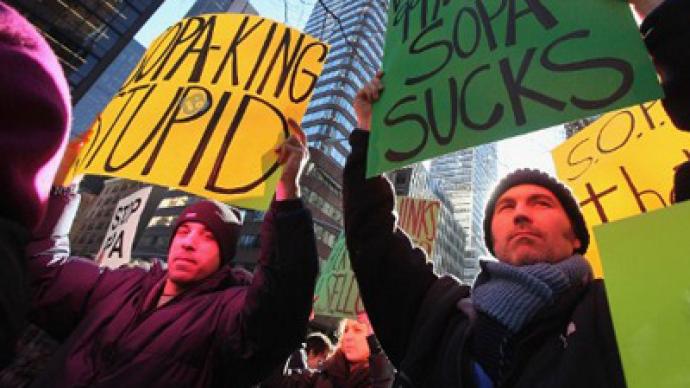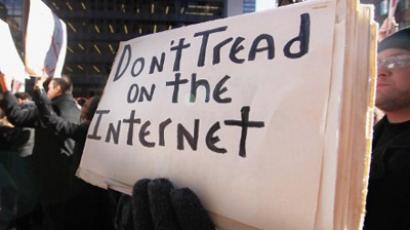Anonymous tweetbomb: Hacktivists round on CISPA

Hacktivist group Anonymous has slammed SOPA’s successor-bill CISPA, due to go before the US House of Representatives. They claim it will allow companies unprecedented access to personnel information, severely violating privacy laws.
Anonymous have dubbed the new legislation as “rampant government spying” even worse than SOPA. The collective called on their supporters to initiate a “24-hour Anti-CISPA tweetbomb” to boycott the new legislation. The action started on Friday at midnight (EST).Anonymous posted a “STOP CISPA TOOLKIT” on Twitter, which extensively outlined the bill, their opposition to it, and how their supporters can stop it.The collective also tweeted a link outlining how 800+ corporations and the US Chamber of Commerce “support Internet freedom crushing” via their support for the act.The proposal currently has bi-partisan support in the US government with 112 members of Congress backing it to be passed, six more following suit on Thursday. However, the draft law has even raised a few eyebrows in the White House, giving rise to concerns that it would allow companies to divulge confidential customer records and communications.Spokesperson for the US National Security Council Caitlin Hayden said that although information sharing legislation is essential to address “critical infrastructure risks” there needs to be “safeguards in place to protect civil liberties.”“Legislation that would sacrifice the privacy of our citizens in the name of security will not meet our nation's urgent needs,” stressed Hayden.CISPA stands for the Cyber Intelligence Sharing and Protection Act, which is a bill aimed at granting private companies greater internet security by allowing them to share personnel information on possible cyber threats.Moreover, how the legislation defines these “cyber threats” has become a bone of contention for opponents of the bill.CISPA defines a threat as “information directly pertaining to a vulnerability of, or threat to a system of network of a government or private entity, including information pertaining to the protection of a system or network.”Critics take issue with the bill’s ambiguous wording and say they will give the government and give companies free rein to access private information.Particular attention has been paid to the clause "notwithstanding any other provision of law." Companies may share information "with any other entity, including the federal government."According to the current phrasing, companies could flout personal privacy protections and share huge amounts of data.“Such information could very well include account names and passwords, histories, message content, and other information not currently available to agencies under federal wiretap laws,” hacktivist group Anonymous write on their website..The House Rules Committee has set a deadline of next Tuesday for amendments to be made to the controversial legislation before the vote takes place in the House of Representatives.CISPA joins the ranks of SOPA, ACTA, PIPA and other legislation put forward in the US supposedly to step up internet security. All have been the subject of controversy amid accusations that the US government is trampling on civil liberties.














